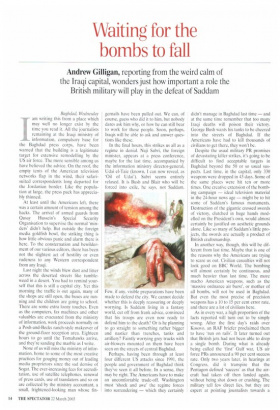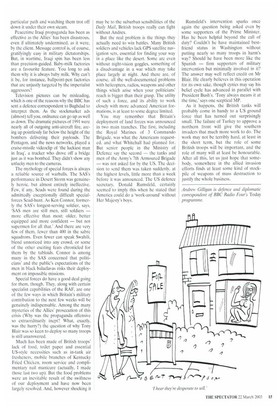Waiting for the bombs to fall
Andrew Gilligan, reporting from the weird calm of the Iraqi capital, wonders just how important a role the British military will play in the defeat of Saddam
Baghdad, Wednesday Iam writing this from a place which may well no longer exist by the time you read it. All the journalists remaining at the Iraqi ministry of information, compulsory base for the Baghdad press corps, have been warned that the building is a legitimate target for extensive remodelling by the US air force. The more sensible among us have believed the advice, On the roof, the empty tents of the American television networks flap in the wind, their safarisuited correspondents long departed for the Jordanian border. Like the population at large, the press pack has appreciably thinned.
At least until the Americans left, there was a certain amount of tension among the hacks. The arrival of armed guards from Qusay Hussein's Special Security Organisation to supervise the normal 'minders' didn't help. But outside the foreign media goldfish bowl, the striking thing is how little obvious panic and alarm there is here. To the consternation and bewilderment of our various editors, there has been not the slightest act of hostility or even rudeness to any Western correspondent from any Iraqi.
Last night the winds blew dust and litter across the deserted streets like tumbleweed in a desert. You had to remind yourself that this is still a capital city. Yet this morning the traffic is out again, many of the shops are still open, the buses are running and the children are going to school. There are some extra loony touches. Even as the computers, fax machines and other valuables are evacuated from the ministry of information, work proceeds normally on a Posh-and-Becks ranch-style makeover of the ground-floor reception area. Eighteen hours to go until the Tomahawks arrive, and they're sanding the marble as I write.
None of us will miss the ministry of information, home to some of the most creative practices for gouging money out of leading media proprietors since the sad demise of Sogat. The ever-increasing fees for accreditation, use of satellite telephones, renewal of press cards, use of translators and so on are collected by the ministry accountant, a small, frightened-looking man whose fin
gernails have been pulled out. We can, of course, guess who did it to him, but nobody dares ask him why, or how he can still bear to work for these people. Soon, perhaps, Iraqis will be able to ask and answer questions like these.
In the final hours, this strikes us all as a regime in denial. Naji Sabri, the foreign minister, appears at a press conference, maybe for the last time, accompanied by the information ministry director-general, Udai el-Taie (known, I can now reveal, as 'Oil of Udai'). Sabri seems entirely relaxed. It is Bush and Blair who will be forced into exile, he says, not Saddam.
Few, if any, visible preparations have been made to defend the city. We cannot decide whether this is deeply reassuring or deeply worrying. Is Saddam living in a fantasy world, cut off from frank advice, convinced that his troops are even now ready to defend him to the death? Or is he planning to go straight to something rather bigger and nastier than trenches, tanks and artillery? Faintly worrying grey trucks with air-blowers mounted on them have been seen on the streets of central Baghdad.
Perhaps, having been through at least four different US attacks since 1991, the people and government of Baghdad think they've seen it all before. In a sense, they may be right. The Americans have to make an uncomfortable trade-off. Washington must 'shock and awe' the regime forces into surrendering — which they certainly
didn't manage in Baghdad last time — and at the same time remember that too many Iraqi deaths will poison their victory. George Bush wants his tanks to be cheered into the streets of Baghdad. If the Americans have had to kill thousands of civilians to get there, they won't be.
Despite the usual military PR promises of devastating killer strikes, it's going to be difficult to find acceptable targets in Baghdad beyond the 50 or so usual suspects. Last time, in the capital, only 330 weapons were dropped in 43 days. Some of the same places were hit ten or more times. One creative extension of the bombing campaign — ideal television material in the 24-hour news age — might be to hit some of Saddam's famous monuments. Destruction of the gigantic crossed swords of victory, clutched in huge hands modelled on the President's own, would almost certainly be justified on aesthetic grounds alone. Like so many of Saddam's little projects, the swords are actually a product of British craftsmanship.
In another way, though, this will be different from last time. Maybe that is one of the reasons why the Americans are trying to scare us out. Civilian casualties will not look good on BBC World. The bombing will almost certainly be continuous, and much heavier than last time. The more macho American weapons, such as the 'massive ordnance air burst', or mother of all bombs, will not be used in Baghdad. But even the most precise of precision weapons has a 10 to 15 per cent error rate, and there are a lot of civilians here.
As in every war, a high proportion of the facts reported will turn out to be simply wrong. After the first day's raids over Kosovo, an RAF briefer proclaimed them to have 'run on rails'. It later turned out that British jets had not been able to drop a single bomb. During what is already being called the 'first' Gulf war, US air force PRs announced a 90 per cent success rate. Only two years later, in hearings at Congress, did it transpire that the Pentagon defined 'success' as that the aircraft had taken off then landed again, without being shot down or crashing. The military tell few direct lies, but they are expert at pointing journalists towards a particular path and watching them trot off down it under their own steam.
Peacetime Iraqi propaganda has been as effective as the Allies' has been disastrous. even if ultimately undermined, as it were, by the client. Message control is, of course, gratifyingly easy in military dictatorships. But, in wartime, Iraqi spin has been less than precision-guided. Baby-milk factories are a favourite feature. You long to ask them why it is always baby milk. Why can't it be, for instance, ballpoint-pen factories that are unjustly targeted by the imperialist aggressors?
Television pictures can be misleading, which is one of the reasons why the BBC has sent a defence correspondent to Baghdad to interpret them. As the stockmarket ads (almost) tell you, ordnance can go up as well as down. The dramatic pictures of 1991 were nearly all of outgoing anti-aircraft fire, arcing up pointlessly far below the height of the bombers delivering their payloads. The Pentagon, and the news networks, played a cruise-missile videoclip of the luckiest man in Iraq', a trucker who drove off a bridge just as it was bombed. They didn't show any unlucky men to the cameras.
The mythology of special forces is always a reliable source of vvarballs. The SAS's performance in Desert Storm was genuinely heroic, but almost entirely ineffective. Few, if any, Scuds were found during the admittedly exceptionally difficult specialforces Scud-hunt. As Ken Connor, formerly the SAS's longest-serving soldier, says, 'SAS men are still men, still soldiers — more effective than most; older, better equipped and more confident — but not supermen for all that.' And there are very few of them, fewer than 400 in the sabre squadrons. Even fewer can speak Swahili, blend unnoticed into any crowd, or some of the other exciting feats chronicled for them by the tabloids. Connor is among many in the SAS concerned that politicians' and the public's expectations of the men in black balaclavas risks their deployment on impossible missions.
Special forces do have a good deal going for them, though. They, along with certain specialist capabilities of the RAF, are one of the few ways in which Britain's military contribution to the next few weeks will be genuinely indispensable. Among the many mysteries of the Allies' prosecution of this crisis (Why was the propaganda offensive so extraordinarily inept? What, exactly, was the hurry?) the question of why Tony Blair was so keen to deploy so many troops is still unanswered.
Much has been made of British troops' lack of food, toilet paper and essential US-style necessities such as in-tank air fresheners, mobile branches of Kentucky Fried Chicken, room service and complimentary nail manicure (actually, I made those last two up). But the food problems were an inevitable result of the swiftness of our deployment and have now been largely resolved. And, however shocking it may be to the suburban sensibilities of the Daily Mail, British troops really can fight without Andrex.
But the real problem is the things they actually need to win battles. Many British soldiers and vehicles lack GPS satellite navigation sets, essential for finding your way in a place like the desert. Some are even without night-vision goggles, something of a disadvantage in a war which may take place largely at night. And there are, of course, all the well-documented problems with helicopters, radios, weapons and other things which arise when your politicians' reach is bigger than their grasp. The utility of such a force, and its ability to work closely with more advanced American formations, is at least to some degree limited.
You may remember that Britain's deployment of land forces was announced in two main tranches. The first, including the Royal Marines of 3 Commando Brigade, was what the Americans requested, and what Whitehall had planned for. But senior people in the Ministry of Defence say the second — the tanks and men of the Army's 7th Armoured Brigade — was not asked for by the US. The decision to send them was taken suddenly, at the highest levels, little more than a week before it was announced. The US defence secretary, Donald Rumsfeld, certainly seemed to imply this when he stated that America could do a 'work-around' without Her Majesty's boys. Rumsfeld's intervention sparks once again the question being asked even by some supporters of the Prime Minister. Has he been helpful beyond the call of duty? Couldn't he have maintained bestfriend status in Washington without putting nearly so many troops in harm's way? Should he have been more like the Spanish — firm supporters of military intervention but minimally involved in it? The answer may well reflect credit on Mr Blair. He clearly believes in this operation for its own sake, though cynics may say his belief cycle has advanced in parallel with President Bush's. 'Tony always means it at the time,' says one sceptical MP.
As it happens, the British tanks will probably come in handy to a US ground force that has turned out surprisingly small. The failure of Turkey to approve a northern front will give the southern invaders that much more work to do. The work may not be terribly hard, at least in the short term, but the role of some British troops will be important, and the role of many will at least be honourable. After all this, let us just hope that somebody, somewhere in the allied invasion efforts finds at least some kind of stockpile of weapons of mass destruction to justify the whole business.
Andrew Gilligan is defence and diplomatic correspondent of BBC Radio Four's Today programme.





































































 Previous page
Previous page